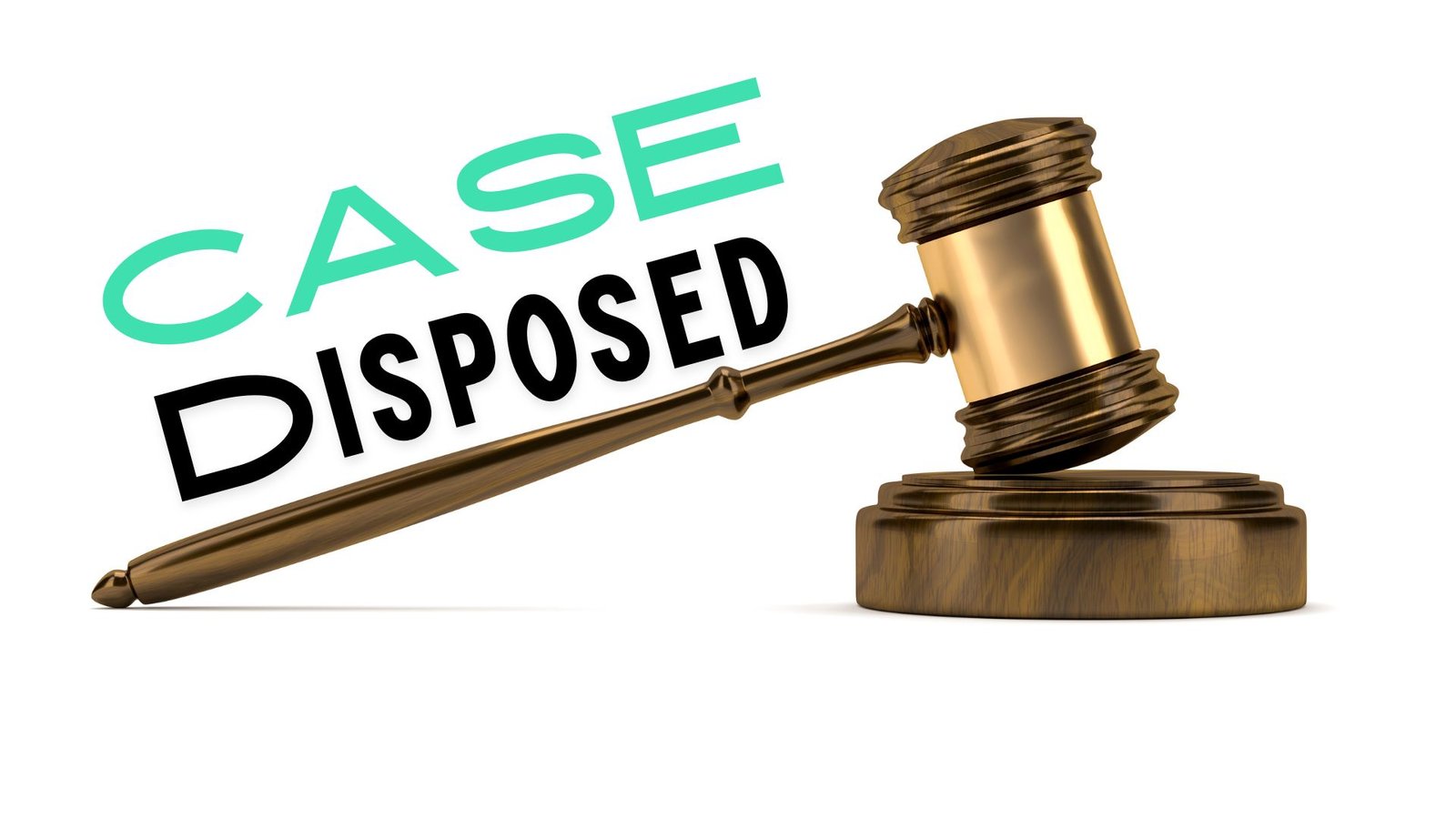On this page you will read detailed information about Case Disposed Meaning.
As you navigate the complex legal system, you may encounter the term “disposed” in reference to your case. With little context, this term can seem ambiguous or concerning. However, having clarity on the meaning behind a case’s disposition can empower you. In this article, we will explore the definition of a disposed case and walk through the implications this status has on your situation. With 100 words allotted, we will use an informational tone to equip you, the reader, with knowledge and understanding around this critical term. Continue reading to gain insight that will allow you to contextualize the disposition of your case.
Understanding Case Disposition
When a legal case’s status is listed as “disposed,” it means the case has been settled, dismissed, or a final judgment has been entered. The specifics of how the case was disposed depends on factors like the type of case and events that transpired during litigation. There are a few common ways a civil or criminal case can conclude:
- Dismissed: The case was withdrawn or thrown out of court. This could happen if the plaintiff decides not to pursue the case further, there is lack of jurisdiction, or the legal matter has become moot.
- Settled: The parties involved came to an agreement outside of court to resolve the issues, often through mediation or settlement negotiations. Settlements typically involve the defendant agreeing to pay the plaintiff an amount of money to drop the case.
- Default Judgment: A judgment entered in favor of the plaintiff when the defendant fails to respond or defend against the case. The court will award the plaintiff whatever was demanded in the complaint since the defendant did not challenge it.
- Summary Judgment: A judgment entered without a full trial. This happens when there are no disputes of material fact and one party is entitled to judgment as a matter of law. The court reviews evidence like depositions, documents, and affidavits to determine if a trial is necessary.
- Trial Verdict: Following a trial, the jury or judge issued a verdict in favor of either the plaintiff or defendant. The verdict marks the end of the trial phase, though appeals are still possible.
- Final Judgment: After appeals have been exhausted or the deadline to file an appeal has passed, the disposition becomes final. The court enters a final judgment and the case is considered officially closed.
In summary, a “disposed” case status means the legal matter has been resolved through settlement, dismissal, default, summary judgment, trial, or all opportunities for appeal have been exhausted. The specifics of how a case concludes depends on the events that unfolded during litigation and the rulings of the court.
Common Ways Cases Can Be Disposed
When a case has a disposition of “disposed,” it means the case has been concluded in some manner. There are several common ways a case can be disposed:
Dismissal
- A case can be dismissed by the court for various reasons, such as lack of jurisdiction, failure to prosecute, or settlement between the parties. This means the case is closed without a full trial.
- Voluntary dismissal: The plaintiff voluntarily decides to drop the lawsuit. The case is dismissed without prejudice, meaning the plaintiff is free to file another lawsuit regarding the same claim.
Settlement
- The parties in the case come to an agreement to resolve the dispute before a full trial. They sign a legally binding settlement agreement and the case is disposed. Settlement allows the parties to avoid the time and expense of a trial.
Judgment
- Following a bench trial (trial by judge) or jury trial, the court enters a final judgment with a verdict for one of the parties. The judgment disposes the case by resolving the dispute in favor of either the plaintiff or defendant.
Default
- If the defendant fails to appear or respond to the lawsuit, the court can enter a default judgment in favor of the plaintiff. The failure to respond results in an automatic win for the other party. The default judgment disposes the case.
In summary, the most common ways for a case to be disposed are through dismissal (voluntary or by court), settlement between parties, judgment after trial, or default due to lack of response. The disposition of “disposed” simply indicates the case has been concluded, regardless of the specific manner. Understanding the various options for how a case can be disposed helps provide context for the status of your case.
What “Disposed” Means for Different Case Types
When the status of a legal case is listed as “disposed,” it means that the case has been completed and resolved in some manner. However, the specific meaning of disposed depends on the type of case.
Civil Cases
For civil lawsuits and other non-criminal legal matters, a disposed case typically means one of two things:
- The case was dismissed, either voluntarily by the plaintiff or involuntarily by the court. This means the case was withdrawn and no further legal action will be taken.
- A judgement was entered, with either the plaintiff or defendant prevailing. This may have involved a settlement between parties, a decision by a judge or jury, or default judgement if one party failed to respond. Once a judgement is entered, the case is considered closed.
In either situation, no further legal proceedings related to the initial complaint will take place. The parties have exhausted all legal remedies, and the case is resolved.
In the previous post, we had shared information about Understanding Mooting: A Definition and Explanation, so read that post also.
Criminal Cases
For criminal cases, a disposed matter usually means one of the following has occurred:
- Guilty plea – The defendant pleaded guilty to the charges, and sentencing has been imposed by the court.
- Trial verdict – A trial was held, and either a guilty or not guilty verdict was delivered by the jury. If guilty, sentencing will follow.
- Dismissal – The charges against the defendant were dropped by the prosecutor or dismissed by the judge. The defendant is free of liability and the case is closed.
- Diversion program completion – For minor offenses, completion of a diversion or deferred judgement program. Charges are then often dropped.
- Mistrial – The trial ended inconclusively, and prosecutors must decide whether to retry the case or dismiss the charges.
Once sentencing has been imposed or charges dropped in a criminal case, the matter is disposed as the court’s jurisdiction over the particular incident comes to an end.
In summary, a disposed case means legal proceedings have concluded and the matter is resolved and closed. The specifics of how it was resolved and the implications depend upon whether it was a civil or criminal case.
Checking the Disposition Status of Your Case
Once a case has reached a resolution, the court will update the case status to “disposed.” This means that the case is closed and no further action will be taken. As a party to the case, it is important to check on the disposition to understand the outcome and any responsibilities you may have.
To check your case’s disposition status, you will need to access the court records. This can typically be done on the court’s website, by calling the court clerk’s office, or by visiting the courthouse in person. When searching for your case, you will need information like the case number, filed date, or names of parties involved.
Upon locating your case, review the disposition section for details on how the case was resolved. Common dispositions include:
- Dismissed: The case was dismissed by the court, often due to lack of grounds or evidence to move forward. No judgment is issued.
- Default Judgment: A judgment was issued in favor of the plaintiff due to the defendant failing to respond or appear. The plaintiff is awarded the requested damages or remedies.
- Consent Judgment: Both parties consented to the judgment issued by the court. Often the result of a settlement agreement.
- Trial Judgment: A judgment was issued after a trial on the merits of the case. Indicates the plaintiff or defendant prevailed after evidentiary proceedings.
- Settlement: The parties reached an agreement to settle the case out of court. The case is disposed due to settlement but no judgment is issued by the court.
The disposition will specify who the judgment was in favor of, any awarded damages, and responsibilities of parties going forward. Be sure to comply with all terms of the disposition to avoid further legal action. If you have questions about the meaning or implications of the disposition, consult with a legal professional.
Frequently Asked Questions About Case Disposition
When a case’s status is listed as “disposed”, it means that the case has been completed in some form and is no longer pending or open. The specifics of how a case was disposed can vary. Some common ways include:
Dismissed: The case was dismissed by the court, often due to lack of evidence or jurisdiction.
Settled: The parties in the case reached a settlement agreement to resolve the issues, so the court closed the case.
Judgment entered: The court entered a final judgment that ended the case after a trial, motion, or plea.
Default judgment: A judgment was entered in favor of the plaintiff because the defendant failed to respond or appear.
The details regarding how your case was disposed should be available on the public court records for your case. You have a right to access most court records, so you can:
i) Visit the courthouse where your case was filed and request to view the file. The clerk can look up your case by name or case number and provide you details on the disposition.
ii) Search for your case on the court’s website. Many courts now have online dockets and records that are available for public viewing. The docket should specify how the case was disposed.
iii) Hire an attorney to research the court records on your behalf. If you are unable to access the records yourself, an attorney can investigate and report back the details of your case’s disposition.
In some circumstances, a disposed case can potentially be reopened. A few common reasons a court may reopen a disposed case include:
New evidence: If substantial new evidence comes to light that could change the outcome, the court may reopen the case.
Fraud: If there is clear evidence that fraud impacted the disposition of the case, it may be grounds to reopen.
Clerical error: A minor clerical error, omission, or mistake in the court records or proceedings may allow a case to be reopened to correct the issue.
Appeal: If a timely appeal of the disposition was filed, the appellate court can order the trial court to reopen the case.
The specifics of reopening a disposed case will depend on the laws of your state and the policies of the court where your case was filed. You should consult with a licensed attorney to determine if your case qualifies to be reopened.
Conclusion
As you navigate the court system, it is important to understand the meaning behind legal terms to fully grasp your case status. When your case shows a status of “disposed,” this means the court has reached a resolution or conclusion in your case through a dismissal, settlement, or final judgment. Keep this definition in mind as you follow your case timeline. Though the legal process can feel complex or unclear at times, being informed on terminology like “disposed” helps you stay engaged and aware. Use this knowledge to your benefit as your case comes to completion.
Disclaimer
The information and services on this website are not intended to and shall not be used as legal advice. You should consult a Legal Professional for any legal or solicited advice. While we have good faith and our own independent research to every information listed on the website and do our best to ensure that the data provided is accurate. However, we do not guarantee the information provided is accurate and make no representation or warranty of any kind, express or implied, regarding the accuracy, adequacy, validity, reliability, availability, or completeness of any information on the Site. UNDER NO CIRCUMSTANCES SHALL WE HAVE ANY LIABILITY TO YOU FOR ANY LOSS OR DAMAGE OF ANY KIND INCURRED AS A RESULT OR RELIANCE ON ANY INFORMATION PROVIDED ON THE SITE. YOUR USE OF THE SITE AND YOUR RELIANCE ON ANY INFORMATION ON THE SITE IS SOLELY AT YOUR OWN RISK. Comments on this website are the sole responsibility of their writers so the accuracy, completeness, veracity, honesty, factuality and politeness of comments are not guaranteed.
So friends, today we talked about Case Disposed Meaning, hope you liked our post.
If you liked the information about Case Disposed Meaning, then definitely share this article with your friends.








